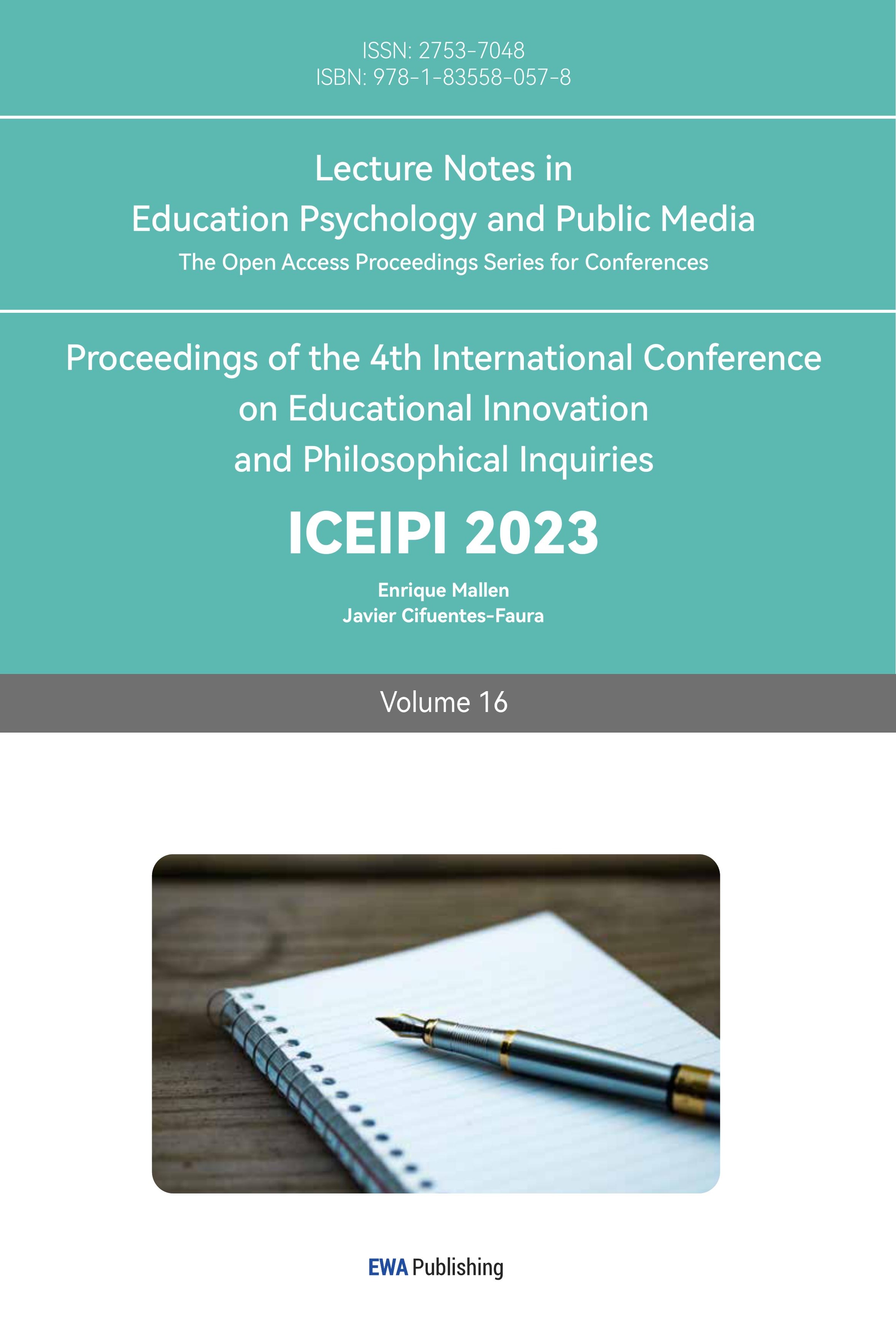References
[1]. Ministry of Education of the People’s Republic of China, Central Civilization Office. (2015). Implementation Opinions on Deepening the Creation of Civilized Campus. Retrieved from http://www.moe.gov.cn/srcsite/A06/s3325/201510/t20151014_213368.html
[2]. Chen, H. (2023). The Hundred-Year Evolution and Development Experience of the Communist Party of China’s “How to Cultivate People” Ideology. Journal of Shanghai Jiao Tong University (Philosophy and Social Sciences Edition), 31(04), 25-40. DOI: 10.13806/j.cnki.issn1008-7095.2023.04.003.
[3]. Ministry of Education of the People’s Republic of China, Central Civilization Office. (2015). Standards for Civilized Campus in Middle Schools.
[4]. Shanghai Education and Health Work Committee of the Communist Party of China, Office of the Shanghai Civilization Campus Creation Evaluation Index System. (2021).
[5]. She, S. (2015). China’s Dream of Chinese Spirit. Wuhan University Press.
[6]. Zhang, T. (2020). Study on the Emotional Investment of High School Students’ Learning from the Perspective of Caring for Education. (Doctoral dissertation, Huazhong Normal University). DOI: 10.27159/d.cnki.ghzsu.2020.004161.
[7]. Liu, H. (2022). Construction of Basic Education Data Governance Model and Bottom-Level Practice Research. (Doctoral dissertation, East China Normal University). DOI: 10.27149/d.cnki.ghdsu.2022.000828.
[8]. Tang, Y., & Zhao, Y. (2023). Analysis of Parent Satisfaction and Influencing Factors of After-School Services for Primary and Middle Schools: Based on the Investigation of 8 Counties (Districts) in X Province. Journal of Jilin Provincial Institute of Education, 39(02), 73-80. DOI: 10.16083/j.cnki.1671-1580.2023.02.012.
[9]. Chen, C. (2022). Improving the Evaluation System of Primary and Secondary School Teachers and Stimulating Their Potential: Inspiration from the Evaluation of Teachers in Developed Countries. Educator, (02), 19-21.
[10]. Wang, P., & Ma, J. (2019). Integration of Core Socialist Values into the Cultivation of Core Competencies of Middle School Students. Teaching of Ideological and Political Courses, (09), 8-10.
[11]. Ji, M. (2023). Research on the Construction of the Curriculum System of Labor Education for Middle School Students. Teaching Management and Education Research, 8(07), 80-82.
[12]. Wu, R. (2022). Creating Diverse Teaching Situations to Improve Students’ Learning Efficiency. China School Sports, 41(12), 60-61.
Cite this article
Shen,Z.;Zhang,G. (2023). Analysis of How to Improve the Spiritual and Cultural Literacy of Middle School Students from the Perspective of Creating a Civilized Campus Policy. Lecture Notes in Education Psychology and Public Media,16,235-241.
Data availability
The datasets used and/or analyzed during the current study will be available from the authors upon reasonable request.
Disclaimer/Publisher's Note
The statements, opinions and data contained in all publications are solely those of the individual author(s) and contributor(s) and not of EWA Publishing and/or the editor(s). EWA Publishing and/or the editor(s) disclaim responsibility for any injury to people or property resulting from any ideas, methods, instructions or products referred to in the content.
About volume
Volume title: Proceedings of the 4th International Conference on Educational Innovation and Philosophical Inquiries
© 2024 by the author(s). Licensee EWA Publishing, Oxford, UK. This article is an open access article distributed under the terms and
conditions of the Creative Commons Attribution (CC BY) license. Authors who
publish this series agree to the following terms:
1. Authors retain copyright and grant the series right of first publication with the work simultaneously licensed under a Creative Commons
Attribution License that allows others to share the work with an acknowledgment of the work's authorship and initial publication in this
series.
2. Authors are able to enter into separate, additional contractual arrangements for the non-exclusive distribution of the series's published
version of the work (e.g., post it to an institutional repository or publish it in a book), with an acknowledgment of its initial
publication in this series.
3. Authors are permitted and encouraged to post their work online (e.g., in institutional repositories or on their website) prior to and
during the submission process, as it can lead to productive exchanges, as well as earlier and greater citation of published work (See
Open access policy for details).
References
[1]. Ministry of Education of the People’s Republic of China, Central Civilization Office. (2015). Implementation Opinions on Deepening the Creation of Civilized Campus. Retrieved from http://www.moe.gov.cn/srcsite/A06/s3325/201510/t20151014_213368.html
[2]. Chen, H. (2023). The Hundred-Year Evolution and Development Experience of the Communist Party of China’s “How to Cultivate People” Ideology. Journal of Shanghai Jiao Tong University (Philosophy and Social Sciences Edition), 31(04), 25-40. DOI: 10.13806/j.cnki.issn1008-7095.2023.04.003.
[3]. Ministry of Education of the People’s Republic of China, Central Civilization Office. (2015). Standards for Civilized Campus in Middle Schools.
[4]. Shanghai Education and Health Work Committee of the Communist Party of China, Office of the Shanghai Civilization Campus Creation Evaluation Index System. (2021).
[5]. She, S. (2015). China’s Dream of Chinese Spirit. Wuhan University Press.
[6]. Zhang, T. (2020). Study on the Emotional Investment of High School Students’ Learning from the Perspective of Caring for Education. (Doctoral dissertation, Huazhong Normal University). DOI: 10.27159/d.cnki.ghzsu.2020.004161.
[7]. Liu, H. (2022). Construction of Basic Education Data Governance Model and Bottom-Level Practice Research. (Doctoral dissertation, East China Normal University). DOI: 10.27149/d.cnki.ghdsu.2022.000828.
[8]. Tang, Y., & Zhao, Y. (2023). Analysis of Parent Satisfaction and Influencing Factors of After-School Services for Primary and Middle Schools: Based on the Investigation of 8 Counties (Districts) in X Province. Journal of Jilin Provincial Institute of Education, 39(02), 73-80. DOI: 10.16083/j.cnki.1671-1580.2023.02.012.
[9]. Chen, C. (2022). Improving the Evaluation System of Primary and Secondary School Teachers and Stimulating Their Potential: Inspiration from the Evaluation of Teachers in Developed Countries. Educator, (02), 19-21.
[10]. Wang, P., & Ma, J. (2019). Integration of Core Socialist Values into the Cultivation of Core Competencies of Middle School Students. Teaching of Ideological and Political Courses, (09), 8-10.
[11]. Ji, M. (2023). Research on the Construction of the Curriculum System of Labor Education for Middle School Students. Teaching Management and Education Research, 8(07), 80-82.
[12]. Wu, R. (2022). Creating Diverse Teaching Situations to Improve Students’ Learning Efficiency. China School Sports, 41(12), 60-61.









